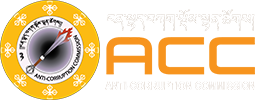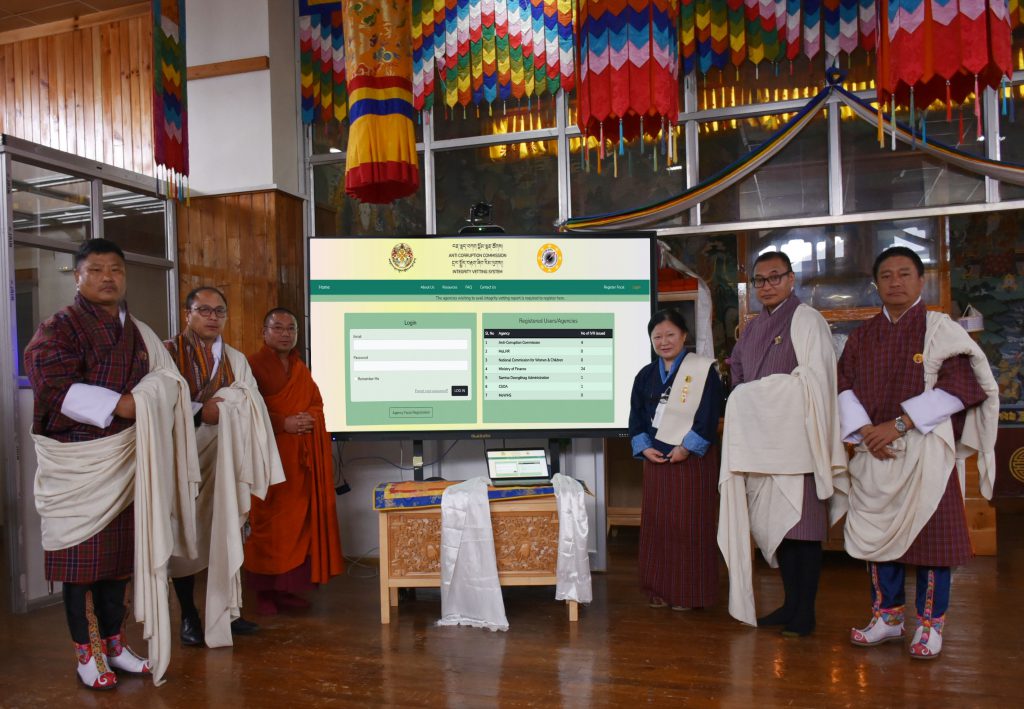The Anti-Corruption Commission (ACC) is honoured to launch the following today, the 30th of December 2022, to come into effect from 31 December 2022:
1.Model Public Service Code of Conduct
The Model Public Service Code of Conduct (hereinafter the Model Code) was launched vide Executive Order No. ACC/LD-06/2022/2745 dated 30 December 2022.
A code of conduct is one of the core rule-based instruments and successful strategies used in the fight against corruption as it addresses the preventive, educational and enforcement aspects necessary to effect change in the ethical climate of public service.Section 35 of the Anti-Corruption Act of Bhutan (ACAB) 2011 specifically provides for the ACC to develop a model public service code of conduct and advise public agencies as to its adoption. The heads of an agency or senior management are to be held responsible for implementing the code by developing their own code and compliance program, based on this code. Accordingly, the ACC developed and approved the Model Code in its 103rd Commission meeting on 10 November 2022. It sets out the standards of integrity and that public servants are required to comply with and the procedures to help them meet those standards. It also serves to inform the public on what they are entitled to expect in terms of the conduct of public servants.
It comprises an introductory statement of the objectives and manner in which the Model Code should be implemented; the standards of integrity and conduct as well as the process of dealing with complaints and sanctions for any breach. An important feature is the requirement for public agencies to seek and obtain an integrity vetting report to guide and inform on any human resource action and/or award or enter into contractual relations.
The Model Code is not intended to replace existing or future codes of conduct. Rather, public agencies are asked to develop and/or revise its own specific code of conduct, based on the Model Code, to suit their respective mandates and functions and prescribe requirements that not only complement and supplement but may indeed be more onerous than those in the Model Code. The private sector agencies are encouraged to subscribe to the Model Code and this would be furthered under the aegis of the Business Integrity Initiative of Bhutan, a forum to mainstream integrity in the private sector.
Implementation of the Model Code by public agencies will be monitored and evaluated through the Organizational Integrity Plan derived from the National Integrity and Anti-Corruption Strategy.
2. Integrity Vetting Rules 2022
The Integrity Vetting Rules 2022 have been adopted to promote and mainstream integrity in the public and private sector. It applies to the selection, recruitment, promotion, nomination, appointment, or selection of a person to public office or in the award of a public contract or entering into a public contractual relationship.
Integrity Vetting refers to the process of assessing, against official documented records, the integrity of a person before selection, recruitment, promotion, nomination or appointment in a public or private office and/or to take part in the National Parliament or Local Government or entering into a public contractual relationship.The Rule establishes the Integrity Vetting System as a repository of information for integrity vetting; institutes a system of issuing Integrity Vetting Report; and provides detailed procedures for processing Integrity Vetting Report and effective implementation.The IVR is provided, under the Rules, to be of four categories: a) No Record; b) Provisional Record; c) With Record; and d) Adverse Record. For election to Parliament and Local Governments, based on the requirement of the Election Commission of Bhutan, two types of report will be issued: a) Integrity Vetting Report with No Record and b) Integrity Vetting Report with Adverse Record.
The IVR shall be made available for selection, recruitment, promotion, nomination, or appointment to a public office; award of a public contract or for entering into a contractual relationship, where contract value involves a minimum threshold limit for open bidding as may be prescribed under the Procurement Rules and Regulation; and to requesting private entities and agencies.
3. Integrity Vetting System
ACC has been issuing Integrity Vetting Report (IVR) since 2016, pursuant to Section 24(1)(a) and (j) of the ACAB 2011 to assist agencies in making informed decision related to human resource action. A total of 5,112 individuals from 187 agencies have been vetted to date.The current process of issuing the IVR has been manual: filling up physical forms by the agency and preparing and delivering reports in the same manner. The Reports are generated based on the information/records stored in various internal databases within the ACC. To ensure accuracy and secure credibility and tenacity of the initiative, the web-based Integrity Vetting System (IVS) has been developed to serve as a repository of information to be used for the vetting and generation of the IVR. The system will automate the fact-based information gathered mainly from the investigation module of ACC’s Complaint and Investigation Management System and Asset Declaration System. Data from relevant external agencies/databases will be integrated ensuing the successful launch of the system to ensure comprehensiveness of the vetting report.
4. myACC: Mobile app to report corruption and track status of complaint lodged with ACC
The mobile application myACC is a technological platform to report corruption and/or for a complainant to track the status of his/her complaint lodged with ACC, using the unique registration number provided upon reporting a complaint.myACC facilitates citizens in fulfilling the constitutional responsibility to act against corruption by reporting it. While the number of complaints has risen steadily over the years, it was only in the past year that the number of known complainants was slightly more than anonymous ones with significant numbers still preferring anonymity in reporting corruption. While respecting the individual’s choice, it has to be pointed out that when the identity of the complainant is known to ACC, it greatly facilitates follow-up action. Strict confidentiality is maintained and assured. In the case of anonymous complainants, besides being deprived the opportunity to crosscheck and seek further information from the complainant, it also becomes most challenging to convey the decision/action on the complaint(s) lodged, resulting in discontentment and discouragement amongst the general public.
Therefore, myACC has been developed to facilitate a complainant to conveniently track the status of his/her complaint from a handheld device. The App will operate on both android and IOS operating systems. The approval for this app has been submitted to the third-party(company). The public will be advised as soon as the approval is accorded, and individuals can download and use the app. The ACC urges every citizen to report corruption and make a valuable contribution towards a resilient, accountable and corruption-free Nation.
5. Asset Declaration Rules 2022
Asset Declaration (AD) is an important tool to hold public officials accountable. It is a means to anchor ethics and integrity in the public sector, thus promoting responsibility, accountability and transparency in governance. The ACC introduced the system of asset declaration for public officials in 2006 as part of the overall anti-corruption strategy with the enactment of ACAB 2006.
The primary objective of AD is to detect and prevent illicit enrichment, facilitate management of Conflict of Interest (CoI) and promote public trust through greater accountability and transparency. The system of declaring income, assets and liabilities essentially ensures that the custodians of public resources lead a life-style that is within their lawful means and provide an effective reminder to public officials on the duty of accountability that comes with public office.
The AD Rules, first enacted in 2008, required public officials using public resources, their spouse(s) and dependents to declare their income, assets and liabilities. The Rules have been periodically revised thereafter: in 2012 to facilitate greater compliance; and in 2017 to widen the scope and incorporate the management of Conflict of Interest. The AD Rules 2022 further enhances deterrence on offenses related to illicit enrichment and non-compliance to ADR provisions whilst sharpening focus on AD obligations; declaration and penalty; and the roles and responsibilities of AD Administrators and Heads of Agencies.
Similarly, the AD system has undergone regular improvements including the last revamping to facilitate integration with external databases, enhancing data integrity, easing burden on users and administrators and automating verification. The declaration for the Income Year 2021 could be filed on the enhanced AD System.
6. Guideline on Suspension of Business License
Section 24(1)(g) of the ACAB 2011 empowers the ACC to suspend a license or prohibit an individual or entity from participating in contractual relation with public agencies upon finding a prima facie case of corruption. With the section being invoked and enforced over the years, substantive experience and learning has been gained. Therefore, to ensure clarity, consistent application and enforcement of the said section in line with related developments over the years, the Guideline on Suspension of Business License 2022, an internal working document, was developed and approved in principle during the 105th Commission Meeting on 22 November 2022.
…As underpinned in our age-old saying, “the golden yoke of secular laws,” accountability must henceforth become the cornerstone of governance. We must correct those who deviate, be firm with those who do not deliver, replace those who are incompetent, and terminate those who underperform and have therefore become a liability to our system and nation. We must not hesitate to expose those who engage in corrupt practices, so that we send a strong signal to deter others from doing so…
His Majesty The King

